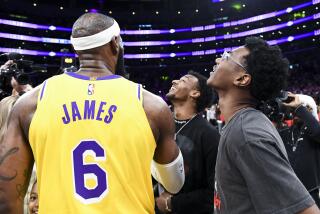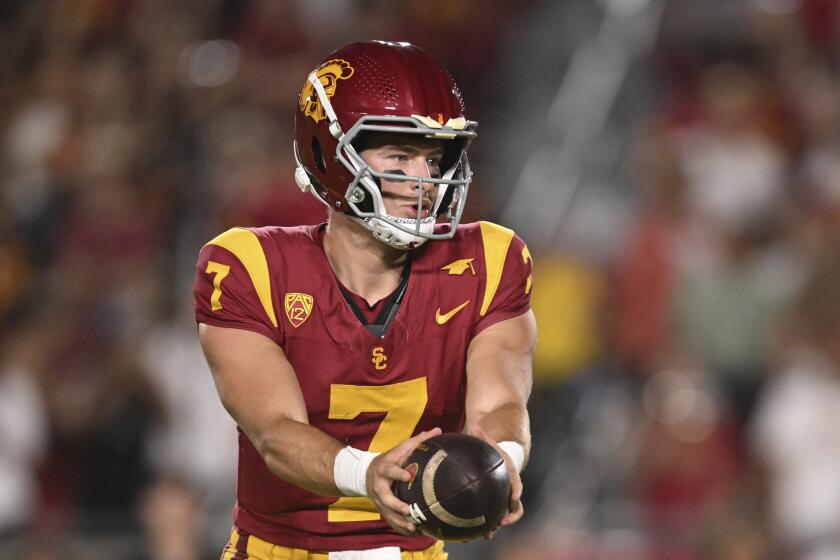No love for this tennis event
The California desert sun can be relentlessly unforgiving. So too, it seems, can the tennis powerhouse Williams sisters.
Eleven years have passed since Serena Williams was greeted with a booming chorus of boos in the women’s finals and left for good. Venus did the same. And with the two-week BNP Paribas Open underway this week at the Indian Wells Tennis Gardens, still no sisters.
“Even now, all these years later, we continue to boycott the event,” Serena wrote in her 2009 autobiography. “It’s become a mandatory tournament on the tour, meaning that the WTA can fine a player if she doesn’t attend. But I don’t care if they fine me a million dollars, I will not play there again.”
I can say from my own seat in the stands that day that this isn’t a simple case of thin skin but of skin color.
In 2001, tennis fans were abuzz over the chance of a Williams vs. Williams matchup. Everyone was talking about it in my hometown of Palm Desert too.
In the quarterfinals, Serena dominated defending champ Lindsay Davenport 6-1, 6-2, while Venus rolled over Elena Dementieva 6-0, 6-3. To the delight of the crowd -- and ESPN, which was to broadcast the final weekend matches -- the sisters would face off in the semifinals the next day.
But come Saturday, Venus pulled out just before the match. Her tendinitis had flared up again, she said. Tournament organizers, nearly 12,000 ticket-holders and ESPN were stunned, angry -- and scrambling.
What also flared up again was the persistent rumor that Richard Williams, the sisters’ outrageously eccentric father and coach, was the puppet master, deciding when they would play each other and who would win.
On Sunday, the finals put Kim Clijsters and Serena Williams at center court.
Questions of race are never easy to answer. What happened that day only brought questions.
The start was ominous. As Venus and her father made the long walk to their courtside seats, the crowd of nearly 16,000 greeted them with bellowing jeers.
Paul Netter, who is black, was there with his wife and described the scene as “something I hadn’t ever experienced in a sporting event. Something on a whole different level.... Very venomous, very loud, with a kind of personal angle.”
I remember watching it unfold in what felt like slow motion, as if I were walking the gantlet with the Williamses. Because I was raised in the Coachella Valley, I wasn’t bothered that my brown skin stood out in the sea of sun-kissed pink skin.
But in a crowd with that much animosity, frankly, I was scared.
Suddenly, the color of my skin seemed to matter. My eyes were mostly locked on Richard Williams. I took my cues from him. If he and Venus left, I wasn’t going to stick around.
Then Serena walked onto the court, along with Clijsters. The booing crested, louder, more insistent. Serena was 19 then and appeared to be shaken by the force of the animosity. I was too.
Neither Netter nor I recall hearing any official call for calm or quiet. Serena herself remarked in her autobiography about the deafening silence from the officials.
Serena’s game began collapsing as the angry, unrelenting crowd applauded her mistakes. But then something shifted on the court. Her supersonic serve returned. Her backhand was on point, her ground stroke irrepressible. And the jeers turned to cheers. She beat Clijsters, 4-6, 6-4, 6-2.
But the jeers have stayed with me.
“I didn’t personally feel threatened,” said Netter, a former Times copy editor who stayed all day through the various matches. “But it was a very ugly, ugly atmosphere ... as much a reaction to Richard as it was, perhaps, racial.”
Richard Williams later said that he had “trouble holding back tears” amid the slurs and what he called “racism” that he and his daughters endured that day. He took a lot of flak for making it a racial issue. Others saw it as calculated poor sportsmanship.
The Times’ Diane Pucin, then a sports columnist, wasn’t sure what had happened was racial. As she wrote after the tournament: “John McEnroe was booed all the time.... Jimmy Connors has been booed. So was Andre Agassi.”
Indeed, they were booed. But it was because of what happened on the court right then -- not two days later.
The racial makeup of the crowd can’t be discounted. Imagine, for a second, if the situation were reversed: a young white player being mercilessly booed by a crowd almost entirely black.
As it was, I felt insecure -- outnumbered that day. It couldn’t but take on the complexion of race on some level.
I was in the middle of an angry mob of sunscreen-slathered, visor-sporting tennis fans. I wasn’t in danger, but I felt I was.
Was it racism, as the Williamses contend?
No, that’s definitely the wrong word. But it was a racialized situation, simply because of the circumstances. The spectators were furious and loud -- never a comfortable situation -- but also merely voicing their displeasure.
So why do the Williamses stay away from Indian Wells?
The reality in America is that most black parents teach their children both intentionally and subconsciously about cultural realities, as matter-of-factly as teaching kids to look both ways before crossing the street.
To blacks, these are the cultural ABCs: Always be conscious.
These lessons become so much a part of us, they course through us just as our blood moves through our veins. They can trigger a fight-or-flight reaction when circumstances seem dangerous.
And these ABCs are why Richard Williams spent his daughter’s entire match sitting still, without his trademark antics, and the reason I was calculating how to exit if the crowd became more menacing.
The experience in the desert left a kind of psy-
chic bruise on Serena and Venus.
“They are marquee players,” Netter said. “They don’t have any special obligation to play” in the tournament. “If they feel unwelcome there, it’s within their right not to play there.”
Netter and his wife have returned to the tournament twice. Not me.
Although I happily return to my hometown often, every time I see the majestic tennis facility, I’m reminded of what happened.
I have no desire to return. And I wouldn’t blame Serena if she and Venus never do.
Yet, even now, I can recall the woman sitting next to me, who was white, shaking her head and saying of Serena, “She’s just a little girl. It’s not her fault.”
That gave me hope that day. It still does.
--
More to Read
Get our high school sports newsletter
Prep Rally is devoted to the SoCal high school sports experience, bringing you scores, stories and a behind-the-scenes look at what makes prep sports so popular.
You may occasionally receive promotional content from the Los Angeles Times.







